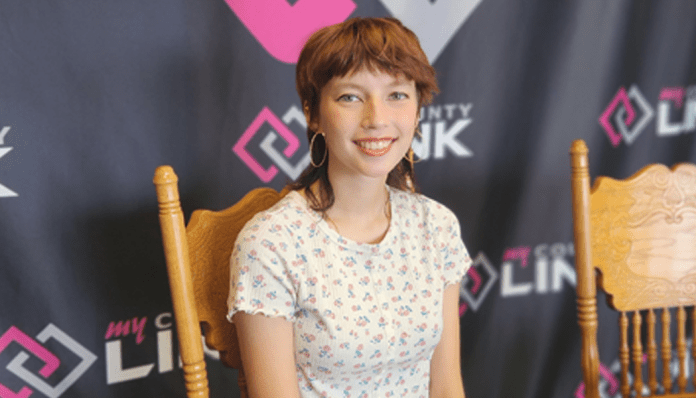Greenville High School student Charlie Pope is no stranger to telling their story and promoting open conversations about mental health.
After being hospitalized at Dayton Children’s, Charlie Pope has become an advocate for children’s mental health.
The Children’s Hospital Association hosts a family advocacy day where they send in patients and their families from all over America to represent their hospitals to talk with lawmakers in Washington DC to increase awareness and advance public policy priorities. Charlie was one of a few representatives from Ohio and got to talk about her time at Dayton Children’s Hospital.
“The services at Dayton Children’s were amazing and literally lifesaving,” Charlie said.
Charlie got to not only tell her story, but she was able to use her story to push for more funding for mental health, making it easier for people to become child psychiatrists and getting resources out into all communities, including rural ones like ours.
“What we were really pushing for is that we have people who want to help, we have systems in place in order to help people, but there is no way to put those into those systems,” Charlie said. “There is a giant gap there.”
Charlie and her mother, Tiffany, talked about what they noticed while Charlie was in the hospital. How there aren’t always enough beds in the specialized care units, how long it can take for children to get the care they need, how few child psychiatrists there are, and how difficult it is to become a child psychiatrist. There is a lack of resources and so many hoops to jump through.
“Just to become a child psychiatrist, you have to not only go through all your psychiatric education, then you have to do an unpaid internship,” explained Tiffany. “The psychiatrist that takes you on as an intern has to go through a year of training in order to have an intern along with all of this reporting and paperwork. So a lot of them don’t want an intern because they come with a lot of work.”
“There are so many young people with lived experience who want to go into that field and want to help,” added Charlie. “But because it’s so hard and it’s so expensive, they just can’t.”
Charlie took everything she and her mother learned to DC to talk to Ohio representatives and make a difference.
While in DC, Charlie met with Jim Jordan’s assistant, Warren Davidson’s assistant, Greg Landsman’s assistant, Sherrod Brown’s director, Mike Carey, and J.D. Vance—all people who represent Ohio and who can make a direct impact right here where we live.
Charlie was very excited about how the meetings went.
“I was surprised at how open they were. I feel like all the conversations we had were very productive.” Charlie said. “One of the things that stuck out to me, every single meeting I went to, I was saying things, and they would listen, and they would take notes. Just the fact that they were actively listening. I felt like they cared. They made me feel heard.”
In one of the meetings, a person Charlie talked to surprised her with how willing they were to open up about the things they had gone through involving mental health.
“I had kind of expected there to be a little bit of stigma and things, and they opened up to me about how they had a close friend who had really struggled.” Charlie said, “It’s crazy how many more people than you expect are affected by it.”
Along with advocating for children’s mental health resources and psychiatry, one of Charlie’s biggest goals is breaking the stigma around mental health and making it easier to talk about. A program she went through at Dayton Children’s helped her and her family with that. It’s called ‘On Our Sleeves.’
On Our Sleeves is a movement and program for children’s mental health. They offer free resources to help families understand children’s mental health and how they can talk about it.
“They have conversation cards for parents to use with their kids so they can start having those open lines of communication so that when mental health or something becomes a struggle, that communication line is already established,” Charlie said. “It makes it easier for kids and parents to communicate about that sort of thing. They have little activity booklets that give kids better language for emotions and how to express them. It’s just a really cool program.”
Tiffany talked about how On Our Sleeves made talking to Charlie about her mental health much easier.
“We talk all the, but when it came to this, we were not using the same language,” Tiffany said. “She was saying one thing, and I was hearing another. The program gave us a common language about what she was going through. We were both talking with the same terms.”
Breaking the stigma around mental health, especially children’s mental health, and being able to have those open conversations is so important. The issues around mental health touch everyone. It makes everything so much easier when we can discuss it openly.
“If Charlie had asthma,” said Tiffany, “one there would be no stigma to that, you would go to the doctor, you would all sit down with the doctor, you would get a treatment plan, you would know the medication, and you would all talk about the aspects of it. So we have to get to the point where mental health is the same way. Where it is a treatment plan that the entire family is involved in.”
Breaking the stigma and opening the conversation about mental health and treatment for mental health is so important and such a big part of Charlie’s inspiring story.
“I’ve seen everything she’s gone through this year and how hard she’s struggled and how hard she’s worked to overcome some of her struggles,” Tiffany shared. “And then to see her get to thrive and go and do something positive with it. She turned a negative in her life into a positive. That’s going to be a positive for other people. She’s a success story, and she’s an inspiration, and she’s brave, and I am just so proud of her.”
“To see her be at such an extreme low to then going out there and talking to congressmen and making a change in the world. I see a genuine smile on her face now. All the things that have come from this have been amazing and beautiful, and I want that for other people too.”
Charlie is very excited to share her story and to bring more awareness to children’s mental health.
“I really want just for me to talk about this sort of thing and for teens and younger kids who live around here to hear about it and realize that it’s okay,” Charlie said. “Because I feel like if I had someone to look up to who was a younger person, that would have changed my perspective a little bit. I want to inspire people.”
Charlie’s story and her advocacy are truly inspiring. She took something difficult she went through and made it into something truly amazing. She is speaking out, breaking the stigma, opening conversations, and pushing for more resources for those going through the same thing she did.
If you or a loved one is struggling, call the Substance Abuse and Mental Health Services Administration National Helpline at 1-800-662-HELP (4357) or TTY: 1-800-487-4889. This is a confidential, free, 24-hour-a-day, 365-day-a-year, information service, in English and Spanish, for individuals and family members facing mental and/or substance use disorders.






